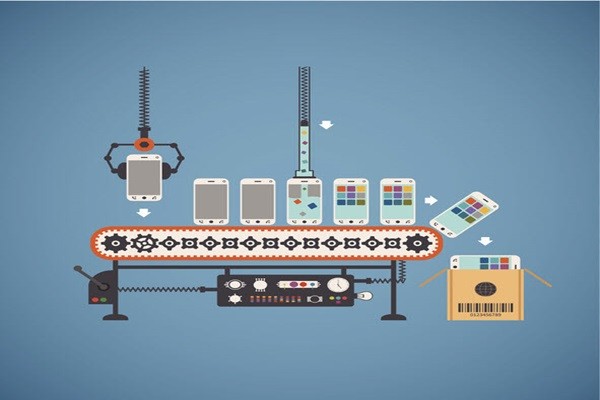One hundred digital clusters that connect smart factories through network will be established in industrial complexes. By supplying one thousand smart factories combined with 5G and AI capabilities and selecting one hundred K-smart “lighthouses”, the South Korean Government will look to transition from quantitative approach to qualitative approach regarding smart factory supply system by 2025.
The South Korean Government announced a “smart manufacturing innovation implementation” plan that has above information as the main point during a meeting that was held on Thursday to examine and adjust current affairs of the country. The plan is to enhance and supply 30,000 smart factories at the same time by 2022.
The Ministry of SMEs and Startups (MSS) is working to improve advancement ratio of companies that are using smart factories from 22% to 30% by 2025. It will also look to improve level of technology from 72% to 83%.
First, the amount of financial support for each company will be increased up to $359,000 (400 million KRW). Companies that have reached a medium 2 level are the main targets. Companies that have reached a medium 1 level will be provided with financial support of up to $179,000 (200 million KRW).
The ministry has also decided to increase number of advanced smart factories as well. Its goal is to demonstrate 5G solutions and develop economic 5G devices and modules and supply one thousand advanced smart factories by 2025. It will also select one hundred K-smart lighthouses out of level 4 factories that represent various industries.

One hundred smart factory integrated districts will also be set up by 2025 by combining existing industrial complexes with smart factories from similar type of business through network. The ministry will also push for “manufacturing + primary and tertiary industries” which will link manufacturing technologies such as smart HACCP (Hazard Analysis and Critical Control Point)”, smart farm, and ecological factories from the field of distribution and industries.
The ministry has also decided to expand related studies in order to improve abilities in supply technology. Along with the Ministry of Science and ICT, the ministry will push for smart manufacturing innovation technology development project worth $295 million (328.8 billion KRW) until 2025. The project will be mainly for cutting-edge manufacturing technology for data sharing between major corporations and small and medium-sized businesses, flexible production technology for production of customized products, and smart work technology for digitalization.
The ministry will also look to establish an AI-based system that utilizes manufacturing data as soon as possible. It plans to establish a cloud-based platform connected to the government’s AI manufacturing platform (Korea AI Manufacturing Platform)) by the end of this year and operate an “solution app store” that supports development and distribution of AI solutions starting from 2021. It will also start supporting demonstration of my manufacturing data for key facilities and processes of “Ppuri companies”.
Kim Il-ho, who is the head of the ministry’s Smart Manufacturing Innovation Planning group, said that the ministry will look to improve overall policies from supply of smart factories to follow-up management qualitatively in order to execute Smart Manufacturing 2.0 policy that will become much more advanced through AI and data.
Meanwhile, the meeting also discussed about the Ministry of Trade, Industry and Energy’s strategy to grow innovation-type small giants and medium-sized companies and public welfare safety measure for the winter suggested by the Ministry of Health and Welfare and the Ministry of the Interior and Safety
Staff Reporter Ryu, Geunil | ryuryu@etnews.com